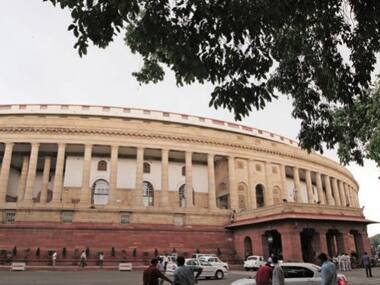The British Parliament prides itself in not wasting a single session. Its Indian counterpart does the exact opposite: it doesn’t utilise a single session. As expected, this Winter Session of Parliament was frosty. Those who had expected a thaw in the relations between the government and the opposition were proved wrong; the dark clouds of the Monsoon Session got murkier. The Opposition, led by the Congress, did not let the government function. The BJP lacked the political precision to thwart the rivals. Result: This session witnessed the lowest number of bills being passed since the Winter Session of 2010. According to data compiled by the PRS Legislative Research, a Delhi-based think tank, as of 18 December the Rajya Sabha had wasted more than half its available hours in the Winter Session. [caption id=“attachment_2556732” align=“alignleft” width=“380”]  Parliament of India. PTI[/caption] Except from a few Bills, including the controversial Juvenile Justice Bill, the Rajya Sabha failed to record any transaction in the Winter Session of 2015. The crucial GST bill did not see the light of the day because legislators kept disrupting the House over issues like the National Herald case, involving Congress chief Sonia Gandhi and vice-president of the party Rahul Gandhi, and charges against Arun Jaitley of mismanaging DDCA. Despite this, the Winter Session was a comparative success compared to the Monsoon Session earlier this year, which was a complete washout. The 20-day session of the Lok Sabha, adjourned sine die, was more productive as compared to the monsoon session which was a virtual washout due to the ruckus caused by the Opposition which had been pressing for ouster of External Affairs Minister Sushma Swaraj, Rajasthan Chief Minister Vasundhara Raje and Madhya Pradesh Chief Minister Shivraj Singh Chouhan over various allegations. However, according to data available with the PRS Legislative, Question Hour had functioned in the House for only 15 percent of the allotted time — in contrast to 88 percent in the Lok Sabha. Juvenile Justice Bill was discussed on the second-last working day of Parliament and we have to credit extraneous reasons for the passage of the bill. The release of the juvenile, who was convicted for his role in the brutal gangrape of the medical student in Delhi in 2012, gathered enough steam for our leaders to wake up and take note of it. While we mull over the time our MPs and legislators waste slinging mud at each other during a Session, it is also paramount to remember that the legislators argue and counter-argue at the cost of the exchequer and eventually taxpayer. As of 2012, each minute of running Parliament during sessions costs the exchequer Rs 2.5 lakh. “In one year, Parliament runs for eighty days during sessions. Each day, business in both Houses are transacted for around six hours. If we take into account the total annual expenditure on Parliament, then for each minute of running the House costs Rs 2.5 lakh,” then parliamentary affairs minister Pawan Kumar Bansal had told reporters back in 2012. But its wrong to view the cost of parliamentary disruptions in monetary terms. The stakes are much bigger. However, the lack of debate in Parliament causes a much bigger harm than just a few thousand crores of rupees. From important policies on education, to public health facilities, infrastructure sectors, justice delivery system, everything is broken. Take for example the education sector. It is a key sector if India wants to grow out of poverty. If surveys, such as done by Annual Status of Education Report (ASER) is to be believed, half the children in the fifth grade cannot still read a paragraph in any language or are able to do simple arithmetic. India is among the worst when it comes to children’s nutrition levels. But Parliament, whichever session, does not find the time to deliberate and debate on these issues. Like MR Madhavan of PRS Legislative Research says, “It is time that our MPs honour the sentiment that they expressed during the golden jubilee and diamond jubilee celebrations of Parliament—that they will use the forum for constructive debate.” The most teeming democracy in the world has become the worst with the noisy MPs stalling the Parliament over the silliest of reasons and ignoring the larger issues that plague the nation. Rajya Sabha JD(U) MP Pavan Varma said that just like Britian’s House of Commons fame to claim is that they never missed a single day of work during any session of its existence, the Indian Parliament will soon pride themselves over a “dubious” record of never having functioned for a single day during a session.
The opposition, led by the Congress, did not let the government function. The BJP lacked the political precision to thwart the rivals. Result: This session witnessed the lowest number of bills being passed since the Winter Session of 2010.
Advertisement
End of Article


)
)
)
)
)
)
)
)
)



